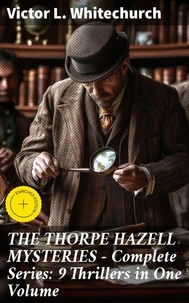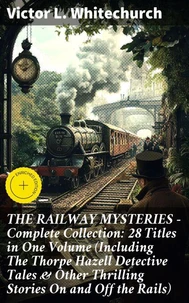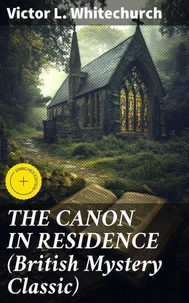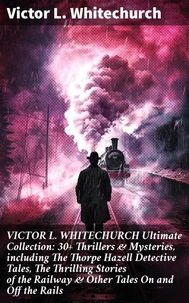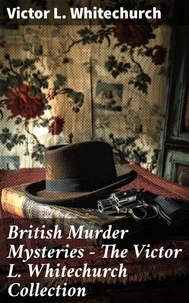British Murder Mysteries - The Victor L. Whitechurch Collection
Par :Formats :
Disponible dans votre compte client Decitre ou Furet du Nord dès validation de votre commande. Le format ePub est :
- Compatible avec une lecture sur My Vivlio (smartphone, tablette, ordinateur)
- Compatible avec une lecture sur liseuses Vivlio
- Pour les liseuses autres que Vivlio, vous devez utiliser le logiciel Adobe Digital Edition. Non compatible avec la lecture sur les liseuses Kindle, Remarkable et Sony
 , qui est-ce ?
, qui est-ce ?Notre partenaire de plateforme de lecture numérique où vous retrouverez l'ensemble de vos ebooks gratuitement
Pour en savoir plus sur nos ebooks, consultez notre aide en ligne ici
- Nombre de pages455
- FormatePub
- ISBN859-65--4739026-8
- EAN8596547390268
- Date de parution13/11/2022
- Protection num.Digital Watermarking
- Taille1 Mo
- Infos supplémentairesepub
- ÉditeurDIGICAT
Résumé
In "British Murder Mysteries - The Victor L. Whitechurch Collection, " readers are presented with a carefully curated anthology of gripping detective tales that encapsulate the essence of early 20th-century crime fiction. Whitechurch's literary style is characterized by its intricate plots, astute character developments, and a keen eye for detail that immerses readers in the atmospheric settings of Victorian and Edwardian Britain.
His narratives often reflect the social intricacies of the times, exploring themes of morality, justice, and the human psyche, making this collection a significant contribution to the genre and a testament to the era's fixation on crime and rationale. Victor L. Whitechurch, an author with a keen interest in engineering and science, blends his analytical skills with his passion for storytelling. Born in a time when the detective genre was burgeoning, Whitechurch was heavily influenced by contemporaries such as Sir Arthur Conan Doyle, and his works often echoed the scientific methods and deductive reasoning that were hallmarks of the genre.
His background in engineering may explain the meticulous nature of his plots, wherein logic and deduction play critical roles in solving complex mysteries. This collection is highly recommended for enthusiasts of detective fiction and scholars alike, as it not only entertains but also provides valuable insights into the formative years of British crime literature. Each story not only sharpens the mind with its puzzles but also engages the reader with rich historical contexts, making it an essential read for anyone seeking to explore the foundations of the modern murder mystery.
His narratives often reflect the social intricacies of the times, exploring themes of morality, justice, and the human psyche, making this collection a significant contribution to the genre and a testament to the era's fixation on crime and rationale. Victor L. Whitechurch, an author with a keen interest in engineering and science, blends his analytical skills with his passion for storytelling. Born in a time when the detective genre was burgeoning, Whitechurch was heavily influenced by contemporaries such as Sir Arthur Conan Doyle, and his works often echoed the scientific methods and deductive reasoning that were hallmarks of the genre.
His background in engineering may explain the meticulous nature of his plots, wherein logic and deduction play critical roles in solving complex mysteries. This collection is highly recommended for enthusiasts of detective fiction and scholars alike, as it not only entertains but also provides valuable insights into the formative years of British crime literature. Each story not only sharpens the mind with its puzzles but also engages the reader with rich historical contexts, making it an essential read for anyone seeking to explore the foundations of the modern murder mystery.
In "British Murder Mysteries - The Victor L. Whitechurch Collection, " readers are presented with a carefully curated anthology of gripping detective tales that encapsulate the essence of early 20th-century crime fiction. Whitechurch's literary style is characterized by its intricate plots, astute character developments, and a keen eye for detail that immerses readers in the atmospheric settings of Victorian and Edwardian Britain.
His narratives often reflect the social intricacies of the times, exploring themes of morality, justice, and the human psyche, making this collection a significant contribution to the genre and a testament to the era's fixation on crime and rationale. Victor L. Whitechurch, an author with a keen interest in engineering and science, blends his analytical skills with his passion for storytelling. Born in a time when the detective genre was burgeoning, Whitechurch was heavily influenced by contemporaries such as Sir Arthur Conan Doyle, and his works often echoed the scientific methods and deductive reasoning that were hallmarks of the genre.
His background in engineering may explain the meticulous nature of his plots, wherein logic and deduction play critical roles in solving complex mysteries. This collection is highly recommended for enthusiasts of detective fiction and scholars alike, as it not only entertains but also provides valuable insights into the formative years of British crime literature. Each story not only sharpens the mind with its puzzles but also engages the reader with rich historical contexts, making it an essential read for anyone seeking to explore the foundations of the modern murder mystery.
His narratives often reflect the social intricacies of the times, exploring themes of morality, justice, and the human psyche, making this collection a significant contribution to the genre and a testament to the era's fixation on crime and rationale. Victor L. Whitechurch, an author with a keen interest in engineering and science, blends his analytical skills with his passion for storytelling. Born in a time when the detective genre was burgeoning, Whitechurch was heavily influenced by contemporaries such as Sir Arthur Conan Doyle, and his works often echoed the scientific methods and deductive reasoning that were hallmarks of the genre.
His background in engineering may explain the meticulous nature of his plots, wherein logic and deduction play critical roles in solving complex mysteries. This collection is highly recommended for enthusiasts of detective fiction and scholars alike, as it not only entertains but also provides valuable insights into the formative years of British crime literature. Each story not only sharpens the mind with its puzzles but also engages the reader with rich historical contexts, making it an essential read for anyone seeking to explore the foundations of the modern murder mystery.



